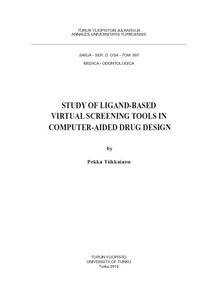| dc.contributor | Institute of Biomedicine; Pharmacology, | en |
| dc.contributor.author | Tiikkainen, Pekka | |
| dc.date.accessioned | 2010-04-14T04:59:25Z | |
| dc.date.available | 2010-04-14T04:59:25Z | |
| dc.date.issued | 2010-05-07 | |
| dc.identifier | ISBN 978-951-29-4248-0 | en |
| dc.identifier.uri | http://www.utupub.fi/handle/10024/59769 | |
| dc.description.abstract | Virtual screening is a central technique in drug discovery today. Millions of molecules can be tested <i>in silico</i> with the aim to only select the most promising and test them experimentally. The topic of this thesis is ligand-based virtual screening tools which take existing active molecules as starting point for finding new drug candidates.
One goal of this thesis was to build a model that gives the probability that two molecules are biologically similar as function of one or more chemical similarity scores. Another important goal was to evaluate how well different ligand-based virtual screening tools are able to distinguish active molecules from inactives. One more criterion set for the virtual screening tools was their applicability in scaffold-hopping, i.e. finding new active chemotypes.
In the first part of the work, a link was defined between the abstract chemical similarity score given by a screening tool and the probability that the two molecules are biologically similar. These results help to decide objectively which virtual screening hits to test experimentally. The work also resulted in a new type of data fusion method when using two or more tools. In the second part, five ligand-based virtual screening tools were evaluated and their performance was found to be generally poor. Three reasons for this were proposed: false negatives in the benchmark sets, active molecules that do not share the binding mode, and activity cliffs. In the third part of the study, a novel visualization and quantification method is presented for evaluation of the scaffold-hopping ability of virtual screening tools. | en |
| dc.language.iso | eng | - |
| dc.publisher | fi=Turun yliopisto|en=University of Turku| | en |
| dc.relation.ispartofseries | Turun yliopiston julkaisuja. Sarja D, Medica – Odontologica | |
| dc.title | Study of ligand-based virtual screening tools in computer-aided drug design | en |
| dc.type.ontasot | fi=Artikkeliväitöskirja|en=Doctoral dissertation (article-based)| | |
| dc.identifier.urn | URN:ISBN:978-951-29-4248-0 | |
| dc.relation.issn | 2343-3213 | |
| dc.description.notification | Siirretty Doriasta | |
| dc.contributor.faculty | fi=Lääketieteellinen tiedekunta|en=Faculty of Medicine| | |
| dc.format.content | fulltext | |
| dc.relation.numberinseries | 897 | - |
